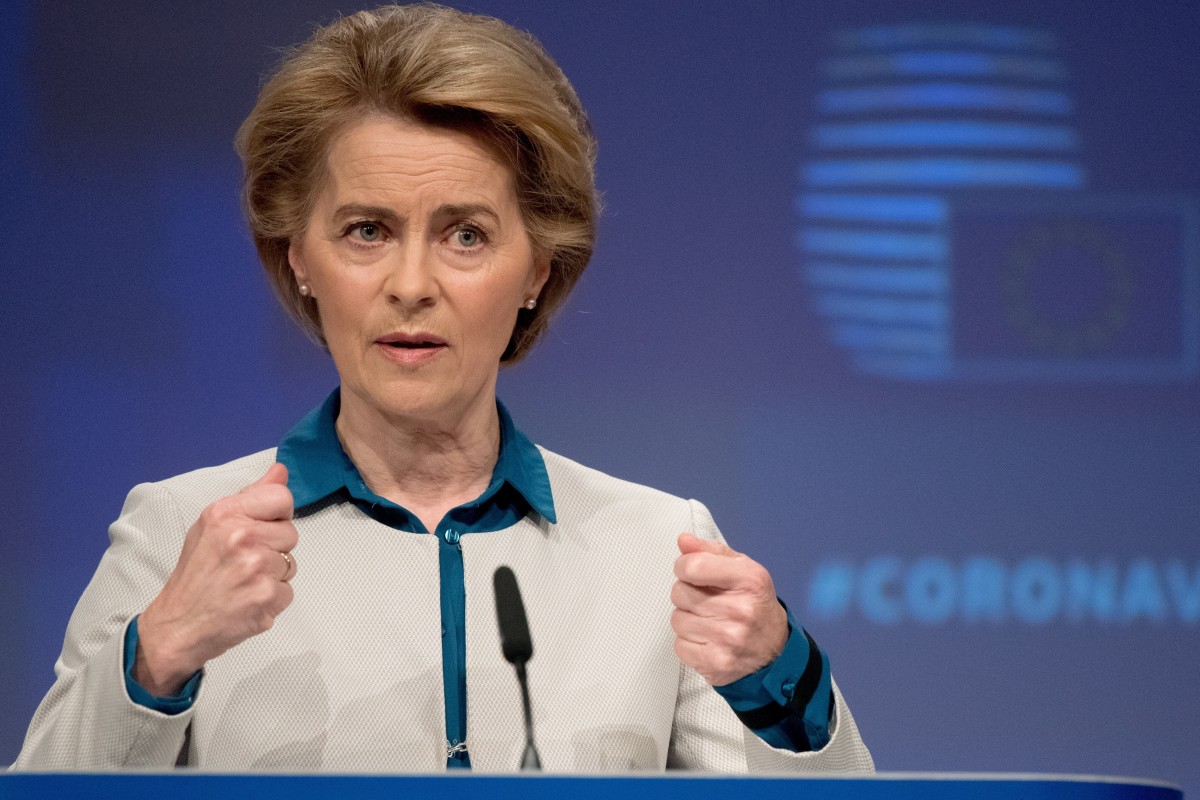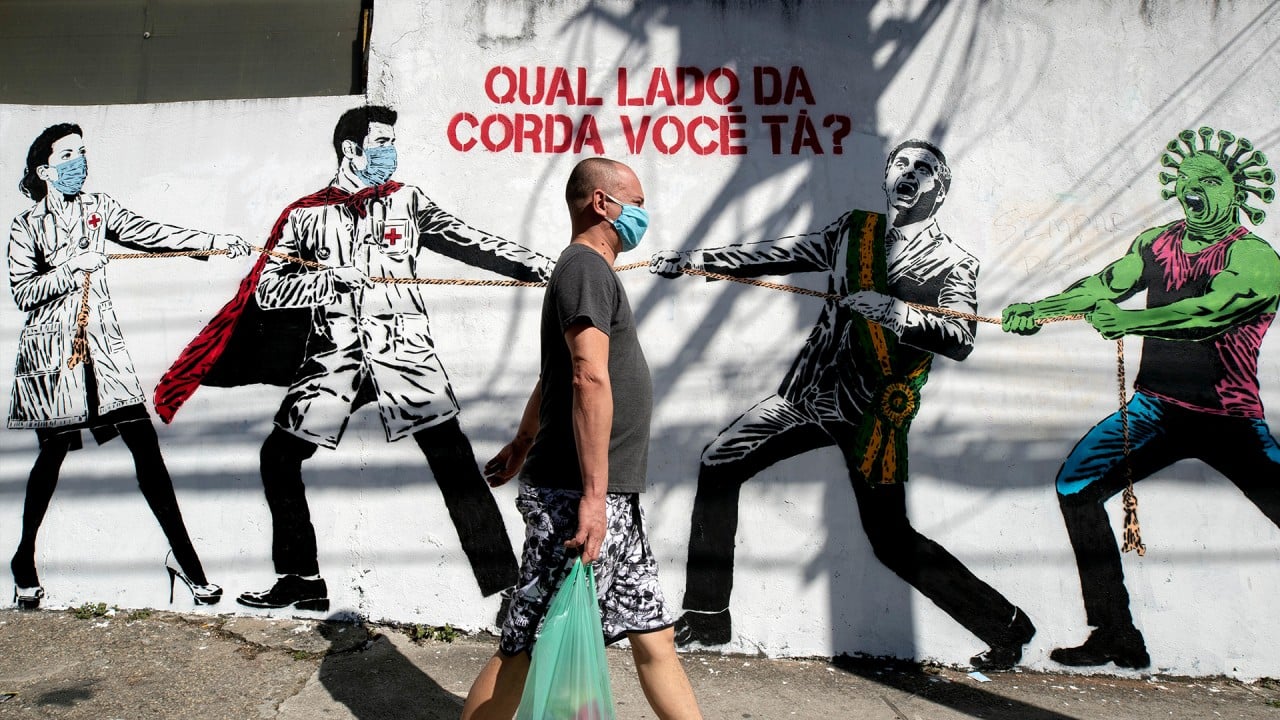Governments must use today’s short-term rescue measures to encourage more responsible business practices, save jobs, address inequality and climate change, and build resilience against shocks
Saadia Zahidi Published: 28 Jun, 2020

The Next Generation EU crisis fund, unveiled by European Commission president Ursula von der Leyen last month, should be taken as a model in promising a fair and inclusive recovery by accelerating the transition to a green digital economy. Photo: European Commission/DPA
As the pandemic-induced lockdown wreaks havoc on the global economy, exposing the inadequacies of many institutions, an era of bigger – and perhaps bolder – government has arrived.
Already, an estimated US$9 trillion has been pumped into the global economy to support households, stem job losses and keep businesses afloat. As some countries emerge from lockdowns, their leaders have a unique opportunity to reshape the economy to provide better, greener and more equitable outcomes for all – what the World Economic Forum deems the “Great Reset”.]\
Building on lessons learned from the 2008 financial crisis, many governments are attaching meaningful conditions to bailouts and other rescue measures. This short-term help can and should be leveraged to encourage more responsible business practices, save jobs, address inequality and climate change, and build long-term resilience against shocks.
For example, France, Denmark and Poland have denied government support to companies with headquarters in tax havens outside Europe. And Britain has banned dividend payments and restricted bonuses in companies accessing its loan scheme.
Governments are also safeguarding jobs by providing incentives for companies to maintain employment levels. US companies accessing Coronavirus Aid, Relief, and Economic Security Act funds must maintain at least 90 per cent of pre-pandemic employment levels until September 30. Japan has applied similar conditions in extending employee-retention help to companies.
Meanwhile, Russia is subsidising wages for companies that retain at least 90 per cent of their workforce, and Italy is implementing a temporary ban on dismissals. It remains to be seen if employment will be maintained after the restrictions are lifted but, for now, they provide a cushion – and a fighting chance – for workers.
Even in deeply distressed sectors such as the
airline industry, rescue measures are being designed to emphasise social and environmental responsibility, and encourage more long-term thinking.
OPINION NEWSLETTER
Get updates direct to your inbox
SUBSCRIBE
By registering, you agree to our T&C and Privacy Policy
Over the past decade, the largest airlines in the United States spent 96 per cent of their free cash flow on share buy-backs, nearly double the rate of other S&P 500 companies. Now, cash-strapped airlines wishing to access government funds must not only cease stock buy-backs and dividend payments until the end of next year, but also agree not to use involuntary furloughs or reduce pay rates until September 30.
Likewise, the French government attached “green strings” to its €7 billion (US$7.9 billion)
bailout of Air France-KLM, requiring that it commit to halving carbon dioxide emissions (per passenger and per kilometre), relative to its 2005 level, by 2030.
Embedding long-term thinking into short-term measures are steps in the right direction. But given the sheer scale of fiscal support being provided and rising concerns about inequality, climate change, unemployment and public debt, the next wave of recovery measures should go further.
The European Commission’s
Next Generation EU crisis fund should be taken as a model. With €750 billion in grants and loans, it promises a fair and inclusive recovery by accelerating the transition to a green digital economy. It would help European countries shift from declining heavy industries while supporting vulnerable workers. But whether all European Union states will get on board remains to be seen.

Experts reluctant to predict end of Covid-19 pandemic as global case numbers keep setting records
bailout of Air France-KLM, requiring that it commit to halving carbon dioxide emissions (per passenger and per kilometre), relative to its 2005 level, by 2030.
Embedding long-term thinking into short-term measures are steps in the right direction. But given the sheer scale of fiscal support being provided and rising concerns about inequality, climate change, unemployment and public debt, the next wave of recovery measures should go further.
The European Commission’s
Next Generation EU crisis fund should be taken as a model. With €750 billion in grants and loans, it promises a fair and inclusive recovery by accelerating the transition to a green digital economy. It would help European countries shift from declining heavy industries while supporting vulnerable workers. But whether all European Union states will get on board remains to be seen.

Experts reluctant to predict end of Covid-19 pandemic as global case numbers keep setting records
The pandemic has thrust governments into a more proactive role than anyone would have imagined just a few months ago. Beyond the immediate health crisis, policymakers must seize the opportunity to implement bold reforms. That includes redesigning social contracts, providing adequate safety nets, cultivating the skills and jobs the future economy will need, and improving the distribution of risk and return between the public, state and private sector.
But while governments must assume leadership, shaping the recovery and charting a new course for growth will require greater collaboration between businesses, public and government institutions, and workers. For the Great Reset to succeed, all stakeholders must have a hand in it.
We cannot return to a system that benefited a few at the expense of many. Forced to manage short-term pressures and confront long-term uncertainties, leaders find themselves at a historic crossroads. Governments’ new clout gives them the means to start building fairer, more sustainable and more resilient economies.
But while governments must assume leadership, shaping the recovery and charting a new course for growth will require greater collaboration between businesses, public and government institutions, and workers. For the Great Reset to succeed, all stakeholders must have a hand in it.
We cannot return to a system that benefited a few at the expense of many. Forced to manage short-term pressures and confront long-term uncertainties, leaders find themselves at a historic crossroads. Governments’ new clout gives them the means to start building fairer, more sustainable and more resilient economies.
Saadia Zahidi is managing director and head of the Centre for the New Economy and Society at the World Economic Forum. Copyright: Project Syndicate
This article appeared in the South China Morning Post print edition as: Bailouts can kick off a great economic reset

Saadia Zahidi
is managing director and head of the Centre for the New Economy and Society at the World Economic Forum.
No comments:
Post a Comment